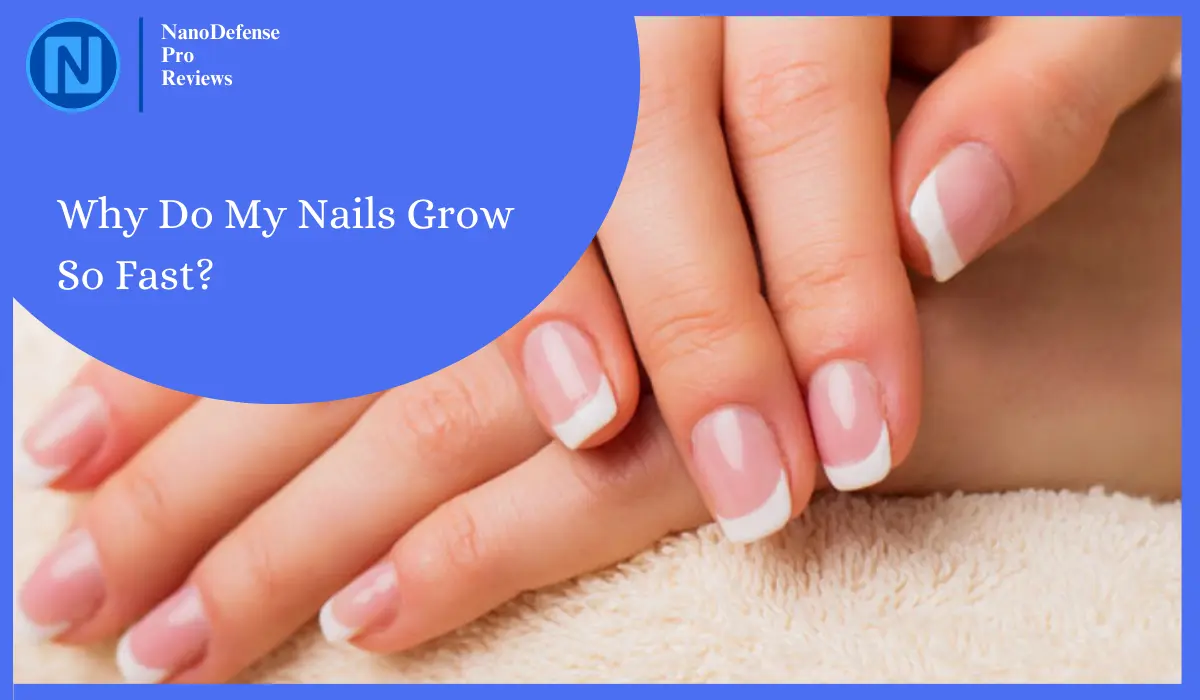Why Do My Nails Grow So Fast? Is It Normal?
Your nails grow quickly due to a combination of genetics, age, nutrition, blood circulation, and overall health. Fingernails grow about 3.5 millimeters per month on average. Fast nail growth is usually a sign of good health, but exceptionally fast growth could indicate an underlying condition. Factors like location (dominant hand), hormones, and trauma can also affect growth rate. If you notice unusual changes like discoloration or thickening, consult a doctor. Maintain a balanced diet rich in nail-healthy nutrients, keep nails trimmed and moisturized, and avoid excessive trauma to promote optimal nail growth.

Disclaimer: This article has been generated with the assistance of AI tools. While our research team has fact-checked the content, readers should independently verify information for accuracy and reliability.
Have you ever noticed your nails growing at an alarmingly fast rate, leaving you wondering, “Why do my nails grow so fast?” It’s a common phenomenon that many people experience, often leading to questions about its normalcy and potential health implications.
In this comprehensive article, we’ll delve into the science behind rapid nail growth, explore the factors that contribute to it, and determine whether it’s a cause for concern or simply a sign of good health.
The Science Of Nail Growth

Nails are composed of a tough protein called keratin, which is constantly regenerating in our bodies. The process of nail growth begins in the nail matrix, a crescent-shaped area located at the base of the nail. Here, new nail cells are produced and pushed outward, compressing and hardening to form the visible nail plate.
The rate at which nails grow is influenced by various factors, including genetics, age, and overall health. On average, fingernails grow at a rate of 3.47 millimeters (mm) per month, or about a tenth of a millimeter per day. Toenails, on the other hand, grow much slower at an average rate of 1.62 mm per month.
Factors Contributing To Fast Nail Growth
Genetics
One of the primary factors that influence the speed of nail growth is genetics. If your parents or grandparents had fast-growing nails, there’s a good chance you’ve inherited this trait as well. Genetics determine the baseline nail growth rate and the thickness of the nail plate.
Nutrition
The foods you consume have a significant impact on the growth and health of your nails. Essential nutrients such as protein, biotin, vitamins A and D, zinc, and iron promote nail growth. Including a variety of nutrient-rich foods that contain these nutrients, such as eggs, nuts seeds, and legumes, in your diet will lead to stronger and faster nail growth.
Blood Circulation
Good blood flow and circulation can contribute to fast nail growth. When you have healthy blood flow, your nails receive the necessary nutrients and oxygen to grow quickly. Your blood carries important nutrients and minerals that are essential for nail growth. This may also explain why nails on your dominant hand tend to grow faster than the ones on your non-dominant hand.
Hormones
Hormones play a pivotal role in regulating various bodily functions, including the nail growth rate of each individual. Thyroid hormones, particularly thyroxine and triiodothyronine, play a crucial role in nail growth. Hormonal fluctuations can also influence the rate of nail growth. For instance, during pregnancy, women often experience an increase in estrogen levels, which can lead to faster nail growth. However, during menopause, women experience a decrease in estrogen levels that corresponds with a slowed nail growth rate.
Age
Generally, nails tend to grow faster in younger individuals and slow down as we age. The nail matrix, where nail cells are produced, becomes less active as we get older, resulting in a decrease in nail growth rate. However, this varies from person to person and can also be influenced by lifestyle factors and overall health.
Trauma Or Injury
Trauma or injury to the nail bed can affect the nail growth rate. People who bite their nails, use their nails as tools, or pick at their cuticles may experience slower nail growth or other nail problems. If you injure your nail, it may take longer to grow normally. For example, trapped blood under the nail, known as subungual hematoma, can slow down nail growth.
Is Fast Nail Growth Normal?
In most cases, fast-growing fingernails are a sign of good health and well-being. It’s an indication that your body is receiving the right nutrients and that you’re in good physical shape. However, exceptionally fast nail growth could also be due to underlying health conditions.
Individuals with conditions like hyperthyroidism, anemia, or diabetes may experience faster nail growth. Certain medications, such as chemotherapy drugs, can also affect nail growth rate due to their impact on cell division and regeneration.
If you notice any unusual changes in your nail growth rate, accompanied by other symptoms, it’s advisable to consult a healthcare professional. They can help determine if the rapid growth is a result of an underlying health condition and provide appropriate treatment if necessary.
Managing Fast Nail Growth
While fast nail growth is generally not a cause for concern, it can be challenging to maintain the length and shape of your manicure. Here are some tips to help manage your rapidly growing nails:
- Keep your nails trimmed and shaped regularly. This will prevent them from becoming too long and unmanageable.
- Use a nail file or buffer to smooth out the edges and prevent snagging or tearing.
- Apply a clear base coat before applying nail polish. This will help protect your nails from staining and damage.
- Take breaks from nail polish and artificial nails to allow your nails to breathe and recover.
- Moisturize your nails and cuticles regularly with a nourishing nail cream or oil. This will keep them healthy and strong.
- Avoid using your nails as tools or biting them, as this can lead to slower growth and other nail problems.
When To Seek Medical Attention?
While fast nail growth is usually a positive sign, there are certain instances when it’s important to seek medical attention:
- If you notice any unusual changes in the color, texture, or shape of your nails.
- If you experience pain, swelling, or inflammation around the nail bed.
- If you have a history of nail fungal infections or other nail disorders.
- If you have an underlying health condition that may affect nail growth, such as diabetes or thyroid disorders.
In these cases, it’s crucial to consult with a dermatologist or your primary care physician to rule out any underlying health issues and receive appropriate treatment if necessary. Consider using a strengthening and protective nail treatment like NanoDefense Pro to maintain healthy and beautiful nails.
Conclusion
Rapid nail growth is a common phenomenon that can be attributed to a combination of genetics, age, nutrition, blood circulation, hormones, and overall health. In most cases, it’s a positive sign of good health and well-being. However, if you notice any unusual changes in your nail growth rate or experience other symptoms, it’s important to consult with a healthcare professional.
By maintaining a healthy lifestyle, including a balanced diet rich in essential nutrients, and practicing proper nail care, you can ensure that your nails continue to grow strong and healthy. Remember, every individual’s nail growth rate is unique, and it’s important to embrace the natural variations in your own nails.

Lisa Miller
Dr. Lisa Miller is a board-certified Dermatologist with over 15 years of experience treating a wide range of skin, hair, and nail conditions. She received her medical degree from the prestigious Columbia University College of Physicians and Surgeons and completed her dermatology residency at the University of California, San Francisco, one of the top dermatology training programs in the country. Dr. Miller is an active member of the American Academy of Dermatology and has authored numerous peer-reviewed articles and book chapters on the latest advancements in dermatological care. She is frequently invited to speak at national and international medical conferences, sharing her expertise with other clinicians. In her private practice, Dr. Miller takes a patient-centered approach, collaborating closely with each individual to develop customized treatment plans. She is passionate about empowering her patients to achieve optimal skin, hair, and nail health through a combination of the latest medical therapies and lifestyle recommendations.
